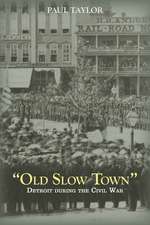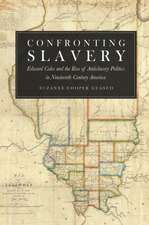Baring the Iron Hand: Discipline in the Union Army
Autor Steven J. Ramolden Limba Engleză Hardback – 14 oct 2009
During antebellum wars the Regular Army preserved the peace, suppressed the Indians, and bore the brunt of the fighting. The Civil War, however, brought an influx of volunteers who overwhelmed the number of army Regulars, forcing a clash between traditional military discipline and the expectations of citizens. Baring the Iron Hand provides an extraordinarily in-depth examination of this internal conflict and the issue of discipline in the Union Army. Ramold tells the story of the volunteers, who, unaccustomed to such military necessities as obeying officers, accepting punishment, and suppressing individuality, rebelled at the traditional discipline expected by the standing army. Unwilling to fully surrender their perceived rights as American citizens, soldiers both openly and covertly defied the rules. They challenged the right of their officers to lead them and established their own policies on military offenses, proper conduct, and battlefield behavior. Citizen soldiers also denied the army the right to punish them for offenses like desertion, insubordination, and mutiny that had no counterpart in civilian life.
Ramold demonstrates that the clash between Regulars and volunteers caused a reinterpretation of the traditional expectations of discipline. The officers of the Regular Army had to contend with independent-minded soldiers who resisted the spit-and-polish discipline that made the army so efficient, but also alienated the volunteers’ sense of individuality and manhood. Unable to prosecute the vast number of soldiers who committed offenses, professional officers reached a form of populist accommodation with their volunteer soldiers. Unable to eradicate or prevent certain offenses, the army tried simply to manage them or to just ignore them. Instead of applying traditionally harsh punishments for specific crimes as they had done in the antebellum period, the army instead mollified its men by extending amnesty, modifying sentences, and granting liberal leniency to many soldiers who otherwise deserved the harshest of penalties. Ramold’s fascinating look into the lives of these misbehaving soldiers will interest both Civil War historians and enthusiasts.
Ramold demonstrates that the clash between Regulars and volunteers caused a reinterpretation of the traditional expectations of discipline. The officers of the Regular Army had to contend with independent-minded soldiers who resisted the spit-and-polish discipline that made the army so efficient, but also alienated the volunteers’ sense of individuality and manhood. Unable to prosecute the vast number of soldiers who committed offenses, professional officers reached a form of populist accommodation with their volunteer soldiers. Unable to eradicate or prevent certain offenses, the army tried simply to manage them or to just ignore them. Instead of applying traditionally harsh punishments for specific crimes as they had done in the antebellum period, the army instead mollified its men by extending amnesty, modifying sentences, and granting liberal leniency to many soldiers who otherwise deserved the harshest of penalties. Ramold’s fascinating look into the lives of these misbehaving soldiers will interest both Civil War historians and enthusiasts.
Preț: 251.62 lei
Nou
Puncte Express: 377
Preț estimativ în valută:
48.15€ • 50.40$ • 39.84£
48.15€ • 50.40$ • 39.84£
Carte disponibilă
Livrare economică 15-29 martie
Preluare comenzi: 021 569.72.76
Specificații
ISBN-13: 9780875804088
ISBN-10: 087580408X
Pagini: 454
Dimensiuni: 152 x 229 x 41 mm
Greutate: 0.91 kg
Ediția:1
Editura: Northern Illinois University Press
Colecția Northern Illinois University Press
ISBN-10: 087580408X
Pagini: 454
Dimensiuni: 152 x 229 x 41 mm
Greutate: 0.91 kg
Ediția:1
Editura: Northern Illinois University Press
Colecția Northern Illinois University Press
Recenzii
“An ambitious, thorough, remarkably well-researched, and well-written examination of discipline, military justice, and punishment in the Union Army.... It makes an important contribution to the field.”—William Skelton, University of Wisconsin-Stevens Point
“As far as I know, there is nothing like this work out there, and if there is, it is certainly not as deeply researched and as thoroughly argued as this. [It] provides more valuable insights into the world—at home and in camp and field—of the Northern volunteer in the Civil War.”—William B. Feis, Buena Vista University
“As far as I know, there is nothing like this work out there, and if there is, it is certainly not as deeply researched and as thoroughly argued as this. [It] provides more valuable insights into the world—at home and in camp and field—of the Northern volunteer in the Civil War.”—William B. Feis, Buena Vista University
Notă biografică
Steven J. Ramold is Associate Professor of History at Eastern Michigan University. He is the author of Slaves, Sailors, Citizens: African Americans in the Union Navy.
Cuprins
Table of Contents
Acknowledgments
Introduction
Chapter
One: “Ancient un-American articles”: American Military Justice to 1861
Two: “Damn Fool!”: The Relationship between Officers and Enlisted Men
Three: “Fields of Satan”: The Impulse of Indiscipline
Four: “Brawls, riots, and midnight orgies”: Alcohol and the Union Army
Five: “There were threats to shoot the officers”: Insubordination in Various Forms
Six: “The Pernicious Practice of Treasonable Persons”: Desertion in the Union Army
Seven: “Descend to the level of the barbarians”: Theft, Property, and Violent Crimes
0 Eight: “No punishment can be too severe”: The Process of Courts-martial
Nine: “We have no right to shoot them”: The Application of Punishment
Epilogue
Notes
Works Cited
Index
Introduction
Chapter
One: “Ancient un-American articles”: American Military Justice to 1861
Two: “Damn Fool!”: The Relationship between Officers and Enlisted Men
Three: “Fields of Satan”: The Impulse of Indiscipline
Four: “Brawls, riots, and midnight orgies”: Alcohol and the Union Army
Five: “There were threats to shoot the officers”: Insubordination in Various Forms
Six: “The Pernicious Practice of Treasonable Persons”: Desertion in the Union Army
Seven: “Descend to the level of the barbarians”: Theft, Property, and Violent Crimes
0 Eight: “No punishment can be too severe”: The Process of Courts-martial
Nine: “We have no right to shoot them”: The Application of Punishment
Epilogue
Notes
Works Cited
Index
Descriere
During antebellum wars the Regular Army preserved the peace, suppressed the Indians, and bore the brunt of the fighting. The Civil War, however, brought an influx of volunteers who overwhelmed the number of army Regulars, forcing a clash between traditional military discipline and the expectations of citizens. Baring the Iron Hand provides an extraordinarily in-depth examination of this internal conflict and the issue of discipline in the Union Army. Ramold tells the story of the volunteers, who, unaccustomed to such military necessities as obeying officers, accepting punishment, and suppressing individuality, rebelled at the traditional discipline expected by the standing army. Unwilling to fully surrender their perceived rights as American citizens, soldiers both openly and covertly defied the rules. They challenged the right of their officers to lead them and established their own policies on military offenses, proper conduct, and battlefield behavior. Citizen soldiers also denied the army the right to punish them for offenses like desertion, insubordination, and mutiny that had no counterpart in civilian life.
Ramold demonstrates that the clash between Regulars and volunteers caused a reinterpretation of the traditional expectations of discipline. The officers of the Regular Army had to contend with independent-minded soldiers who resisted the spit-and-polish discipline that made the army so efficient, but also alienated the volunteers’ sense of individuality and manhood. Unable to prosecute the vast number of soldiers who committed offenses, professional officers reached a form of populist accommodation with their volunteer soldiers. Unable to eradicate or prevent certain offenses, the army tried simply to manage them or to just ignore them. Instead of applying traditionally harsh punishments for specific crimes as they had done in the antebellum period, the army instead mollified its men by extending amnesty, modifying sentences, and granting liberal leniency to many soldiers who otherwise deserved the harshest of penalties. Ramold’s fascinating look into the lives of these misbehaving soldiers will interest both Civil War historians and enthusiasts.
Ramold demonstrates that the clash between Regulars and volunteers caused a reinterpretation of the traditional expectations of discipline. The officers of the Regular Army had to contend with independent-minded soldiers who resisted the spit-and-polish discipline that made the army so efficient, but also alienated the volunteers’ sense of individuality and manhood. Unable to prosecute the vast number of soldiers who committed offenses, professional officers reached a form of populist accommodation with their volunteer soldiers. Unable to eradicate or prevent certain offenses, the army tried simply to manage them or to just ignore them. Instead of applying traditionally harsh punishments for specific crimes as they had done in the antebellum period, the army instead mollified its men by extending amnesty, modifying sentences, and granting liberal leniency to many soldiers who otherwise deserved the harshest of penalties. Ramold’s fascinating look into the lives of these misbehaving soldiers will interest both Civil War historians and enthusiasts.













